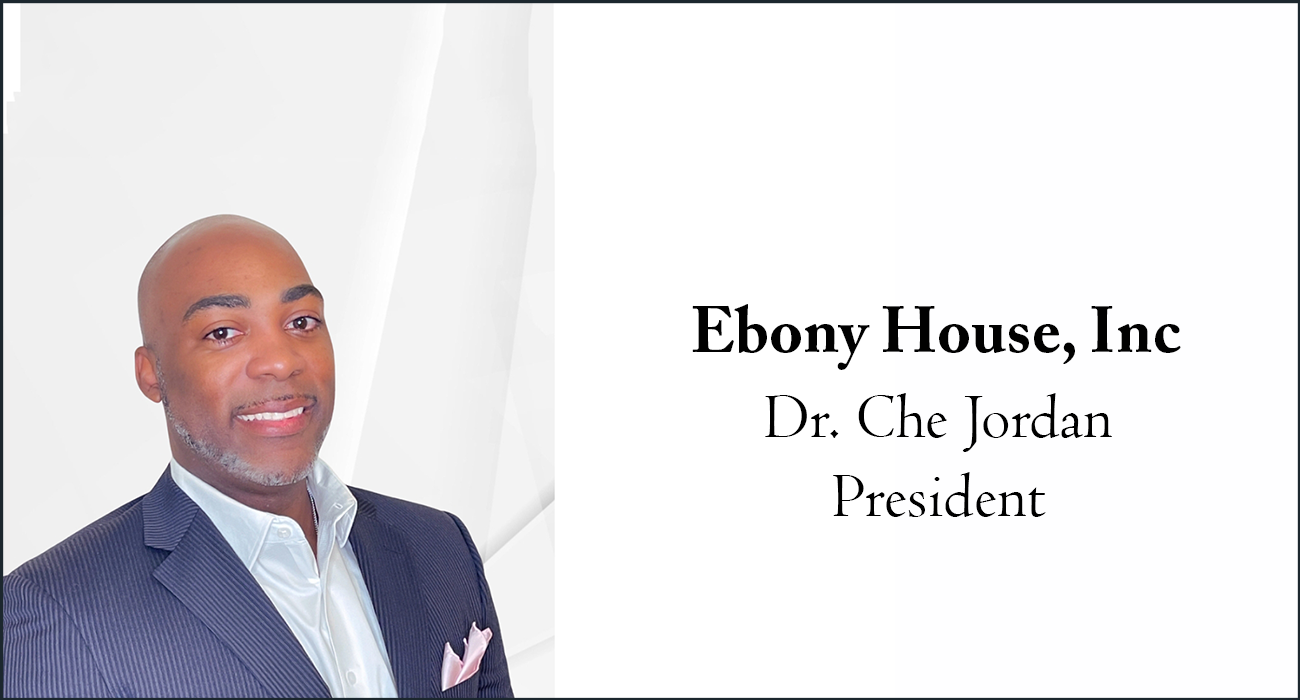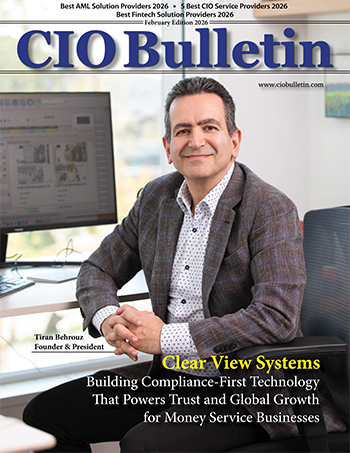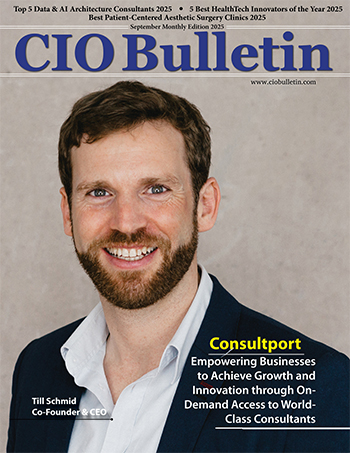Best Inspiring Leaders of the Year 2025
CIO Bulletin

In a world where mental and behavioral health challenges impact countless lives, organizations dedicated to support, healing, and transformation stand as pillars of hope within their communities. With the right care and guidance, individuals struggling with addiction or behavioral health issues can find a path toward recovery and resilience. Many organizations across the U.S. are on a mission to serve those in need, yet few are as uniquely impactful and community-centered and one such organization is Phoenix’s own Ebony House, Inc This inspiring organization not only addresses substance abuse and behavioral health issues but does so with a specialized focus on cultural sensitivity, breaking down barriers, and creating inclusive spaces for healing.
Since its founding in 1973 by Elbertzena Fontenot— a visionary leader dedicated to community well-being—Ebony House has grown into a symbol of hope for those facing substance abuse challenges in Phoenix, Arizona. Driven by a deep understanding of addiction and a strong commitment to her community, Fontenot saw a real need for resources to help African Americans struggling with alcoholism. This passion led her to create Phoenix’s first residential treatment facility specifically focused on serving African Americans. Today, Ebony House has grown to support people from all backgrounds, while staying true to its mission of compassion and care.
We at CIO Bulletin had the privilege of interviewing Dr. Che Jordan, President of Ebony House, Inc. He shared profound insights into how he and his dedicated team are committed to delivering transformative behavioral health programs that inspire healing, foster growth, and nurture enduring strength across diverse communities.
Interview Highlights
Ebony House, Inc was born from a powerful vision to address substance abuse in the Phoenix community. Can you share more about the inspiration and circumstances that led to its founding in 1973?
The inspiration came from Elbertzena Fontenot in 1973; she had received a vision from God to build a business that would be a beacon of hope in Arizona. Ebony House, Inc would serve those struggling with substance abuse and behavioral health challenges. Elbertzena Fontenot invested $500 in hand. As a recovering alcoholic, during a time of civil rights struggles when most African American women faced challenges in opening their own businesses or buying homes, she had the vision and willpower to change people’s lives. A legacy that would impact countless lives over 50 years later. Ebony House continues its mission; the organization remains a vital pillar in the community, providing life-saving behavioral health services to people of all races and backgrounds. Though Fontenot passed away in December 2023, her spirit lives on in the mission, driven by the leadership, staff, and alumni.
Ebony House has shown resilience for over 50 years. What were some of the most significant challenges the organization faced, and how did these experiences contribute to its strength today?
In 2023, the Arizona Health Care Cost Containment System (AHCCCS) faced significant challenges, losing billions of dollars due to fraudulent activities. This situation created complications for the organization, as the billable pay rates for delivering care were altered, making operations increasingly difficult. Despite these obstacles, we successfully navigated 2023 and have consistently been full in both residential and supported housing facilities. In addition, the Children’s Behavioral Clinic remains open to serve those with mental health and substance use issues. This is all due to being proactive and progressive during a time of massive facility closures.
As 2024 began, there was a cyberattack on the Change Healthcare Network, which disrupted payment processes. This attack hindered the organization’s ability to receive timely reimbursements and complicated the submission of new claims. The approach to navigate this issue was to collaborate closely with our clearinghouse to ensure claims were reviewed and submitted efficiently. This helped minimize disruptions and reinforced our commitment to providing essential services to underserved communities. Clients continue to move across the country to come to us and receive treatment. During these challenging times, we stayed dedicated to serving and supporting individuals in need, continuously being adaptable and resourceful so the community has a place to continue to receive vital services.
Ebony House offers a wide range of services today, from substance abuse treatment to family preservation. Can you walk us through the main areas of focus within the organization’s programs?
The focus of our programs includes individual counseling, family counseling, group counseling, alcohol and drug education, general living skills, peer support, relapse prevention, and supportive services for individuals living with HIV/AIDS through our Ryan White Part A/MAI Outreach, which includes both medical and non-medical case management. Clients often come to our program having not eaten a meal in days, or they may arrive from the court system wearing jumpsuits. We provide a level of human decency that many have forgotten, as they have been struggling with addiction on the streets for years.
Cultural competency is central to Ebony House’s mission. How do you ensure that your services and staff reflect the diversity of the communities you serve, particularly among African American and other minority populations?
We hire and maintain a very diverse workplace. We have people from all ethnic groups, which allow clients to identify with and/or relate to those from their own ethnic background. This creates opportunities for everyone to learn from each culture in treatment. We host special cultural dinners, where clients cook their cultural dishes or a favorite childhood meal. This provides a time for clients and staff to bond during dinnertime and fellowship about each other's communities and upbringings. It also gives an opportunity to discuss the positives of being in a place where they can now be understood regarding their life of addiction and trauma. This also helps break down the barriers of racism and allows people to see the individual, not the color of their skin. Alcohol tends to come in two colors: brown and clear, and no one had a problem drinking either one on the streets. So, there’s no need to have a problem now when you are among people from different ethnic groups in treatment.
With a diverse team representing the communities you serve, what strategies do you use to create an environment that empowers staff and volunteers while fostering a strong sense of purpose?
Building a workplace of servant leadership, where regardless of one’s title or position, the core mission is to serve and support people. This fosters a culture of care that benefits both employees and clients. We empower staff and volunteers with qualities such as patience, understanding, humbleness, and humility. Acknowledging that the organization is a place where some clients have lost hope and disconnected from their families—clients who have not seen their children in years due to drugs and incarceration. However, by coming to us, a place of understanding, and investing in the human will of that person, we help give them hope and purpose. This, in turn, gives the staff even more purpose in being committed to serving others. This embodies values in an environment where staff members feel empowered to provide compassionate care. It is a model that fosters ongoing servitude and commitment to building relationships based on trust and respect, ultimately enhancing the quality of service.
Longstanding partnerships with organizations like Mercy Maricopa Integrated Care and the Arizona Department of Child Safety play a key role at Ebony House. How do these collaborations enhance the quality and reach of your programs?
The longstanding relationship with Mercy Care has allowed us to have a grant program. This grant covers Residential and Children’s Behavioral Health, enabling clients who do not have insurance to access treatment. The Arizona Department of Child Safety plays a role by recognizing us as a provider to offer immediate mental health care for children. Many children who are removed from their homes often have to live in offices, emergency shelters, or foster homes, but still need mental health services throughout the process. We have been open to assisting with the child’s transition and providing the necessary mental health services.
“Healing, growth, and development” are core to Ebony House’s mission. Can you share a success story that embodies these values and highlights Ebony House’s impact on an individual or family?
Client Testimonial: Michael Berry and Robert Holloway
The Struggles of Brokenness
When a person feels shattered inside, both mentally and physically—when love and human decency seem to have disappeared—Ebony House becomes the light in the darkness. A mother who no longer recognizes the man she gave birth to, now lost in addiction on the streets. Children left without a protector, provider, or leader, must navigate life without guidance.
The Turning Point
Men who feel broken and hopeless find healing at Ebony House. As our alumnus Michael Berry aptly said, "Iron sharpens iron," emphasizing that growth comes from real, meaningful connections. These men began their journey lost, but through the program, they emerged as new individuals—empowered with purpose. They learned to live for themselves again and to give back, helping change the lives of others fighting the same battle.
Ebony House: A Place of Restoration
Michael Berry’s powerful story touched hearts across the nation when it was featured on The Balancing Act on the Montel Williams Show. Similarly, Robert Holloway, our esteemed Board of Director, shared his remarkable journey on Sonoran Living ABC 15. Their experiences reflect the core value of Ebony House: healing the whole person. Through compassion, understanding, and care, Ebony House has provided the opportunity for these men to rebuild their lives—and their families. The impact is profound, showing that no matter how broken someone feels they can always rise again with the right support.

Elbertzena Fontenot’s vision has carried Ebony House through five decades of service. How does the organization continue to honor her pioneering spirit in both its daily operations and long-term goals?
When clients graduate from the program and become alumni, they continue to express, "That house saved my life," and "Without that house, I may not be here today," honoring the boots on the ground and taking people with addiction off the streets. Every life saved is a result of the vision created 50 years ago. We would like to expand the organization’s residential and supported housing services, offering more clients the opportunity to graduate from the program and transition into stable housing. Notably, we are looking to open an emergency home specifically for military veterans and individuals living with HIV, providing them with rent-free housing for 30 to 90 days.
The Stalwart Leader behind Ebony House, Inc’s Unwavering Success
Since taking on the role of President in December 2022, Dr. Che Jordan has led Ebony House, Inc to remarkable success, achieving over 90 percent client satisfaction for two consecutive years. His leadership has cultivated a workplace culture built on respect, appreciation, and a shared commitment to creating an environment where both clients and employees can thrive.
Under Dr. Jordan’s direction, Ebony House has received numerous accolades, including a Recognition Award and features in prominent media outlets such as The Montel Show: The Balancing Act, Sonoran Living ABC15, 2024 CEO Weekly Magazine, Business Insider Magazine, and CIO Today Magazine.
Dr. Jordan’s leadership has also earned him personal recognition. He was named one of the 2024 ‘Top 100 Innovators & Entrepreneurs’ and honored with the 2024 ‘BNS Winner Magazine Trust Award’. Additionally, he received the 2024 ‘Global Recognition Award’ and the title of ‘Best Business in America for 2024’. His innovative approach to healthcare leadership earned him the 2024 ‘World CEO Award’ for Best Innovative CEO in Healthcare at the city level, as well as the prestigious 2024 ‘American College of Healthcare Executives Regent’s Award’.
Dr. Che Jordan’s commitment to advancing healthcare and his unwavering dedication to empowering those in need have solidified his reputation as a visionary leader in the industry.

Insurance and capital markets







